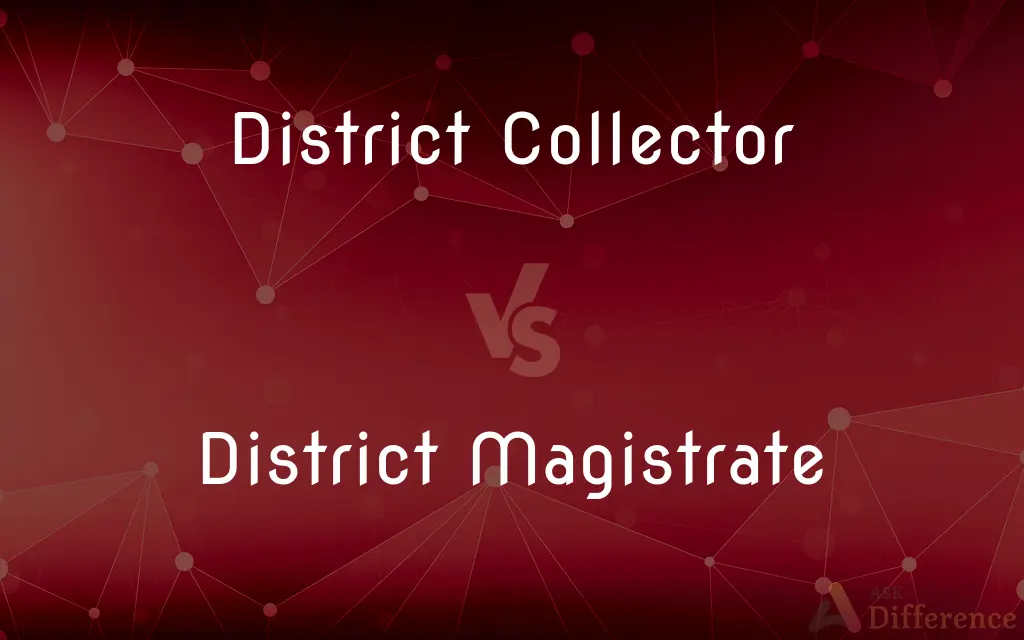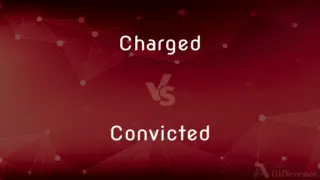District Collector vs. District Magistrate — What's the Difference?
By Tayyaba Rehman — Published on January 10, 2024
The District Collector is primarily responsible for revenue collection and administration, while the District Magistrate oversees law and order within the district.

Difference Between District Collector and District Magistrate
Table of Contents
ADVERTISEMENT
Key Differences
The District Collector is an administrative officer in charge of revenue collection and fiscal management in a district. This role includes overseeing land records, tax collection, and fiscal administration. Conversely, the District Magistrate is primarily responsible for maintaining law and order, public safety, and security within the district.
The District Collector plays a crucial role in disaster management and relief operations within their jurisdiction, coordinating with various departments for effective response. On the other hand, the District Magistrate has judicial powers and can make decisions related to legal and criminal matters, often presiding over court cases at the district level.
In terms of hierarchy and administrative structure, the District Collector reports to the state government and is a key liaison between the state and local governance. The District Magistrate, while also reporting to the state, works closely with the police and judicial departments to enforce laws and judicial orders.
The District Collector often has additional responsibilities related to development projects, welfare schemes, and the implementation of government policies at the district level. The District Magistrate, in contrast, has the authority to impose curfews, issue orders for preventive detentions, and ensure public order during emergencies.
In some regions, the roles of District Collector and District Magistrate are combined into a single position, where the officer is vested with both administrative and judicial powers, streamlining district governance.
ADVERTISEMENT
Comparison Chart
Primary Responsibility
Revenue collection and fiscal administration.
Maintenance of law and order, public safety.
Role in Disaster Management
Coordinates relief and rehabilitation efforts.
Ensures public order and legal compliance during crises.
Administrative Structure
Reports to the state government, manages local affairs.
Works with police and judiciary, enforces laws.
Additional Responsibilities
Oversees development projects and welfare schemes.
Has judicial powers, can preside over legal matters.
Relation to Public and Policies
Implements government policies at the district level.
Ensures public compliance with laws and regulations.
Compare with Definitions
District Collector
An administrative officer responsible for revenue and fiscal management.
The District Collector initiated a tax reform in the district.
District Magistrate
Presides over legal matters and court cases at the district level.
The District Magistrate delivered a verdict in a high-profile case.
District Collector
Coordinates relief efforts during natural disasters and emergencies.
The District Collector mobilized resources for flood relief operations.
District Magistrate
Responsible for crisis management and emergency law enforcement.
The District Magistrate declared a state of emergency after the riots.
District Collector
Manages administrative functions and local governance.
The District Collector chaired a meeting with local municipal officials.
District Magistrate
Has authority to enforce public safety and security measures.
The District Magistrate coordinated with police for a security drill.
District Collector
Oversees land records and property assessments within the district.
The District Collector updated the land registry to reflect new ownerships.
District Magistrate
A judicial officer ensuring law and order within the district.
The District Magistrate issued a curfew order to maintain peace.
District Collector
Implements state government policies at the local level.
The District Collector launched a new health scheme in the district.
District Magistrate
Implements judicial orders and legal directives in the district.
The District Magistrate enforced the court's eviction order.
Common Curiosities
What is the main function of a District Collector?
Focused on revenue collection and administrative management.
Who does the District Collector report to?
Reports to the state government and supervises local administration.
Who does the District Magistrate work with?
Collaborates with police and judiciary for law enforcement.
What are the duties of a District Magistrate?
Primarily responsible for law enforcement and public order.
What legal powers does the District Magistrate have?
Can issue judicial orders, impose curfews, and oversee legal matters.
Can the roles of District Collector and Magistrate be combined?
Yes, in some regions, they are combined into a single role.
What role does the District Collector play in disasters?
Coordinates disaster relief and rehabilitation efforts.
How does the District Magistrate maintain public order?
By enforcing laws, coordinating with law enforcement agencies, and managing crises.
How does the District Collector impact local development?
Manages development projects and implements welfare schemes.
Is the District Collector involved in policy making?
Primarily in implementing and managing state policies at the district level.
What kind of administrative tasks does a District Collector perform?
Handles local governance, policy implementation, and administrative functions.
What is the District Magistrate's role during emergencies?
Ensures public safety and compliance with emergency regulations.
Can the District Magistrate enforce detentions?
Yes, they have the authority to order preventive detentions.
What is the importance of the District Magistrate in legal proceedings?
Crucial in ensuring legal compliance and presiding over district-level court cases.
How do District Collectors handle fiscal responsibilities?
Manages district revenue, budgets, and financial planning.
Share Your Discovery

Previous Comparison
Charged vs. Convicted
Next Comparison
Arduino Micro vs. Arduino NanoAuthor Spotlight
Written by
Tayyaba RehmanTayyaba Rehman is a distinguished writer, currently serving as a primary contributor to askdifference.com. As a researcher in semantics and etymology, Tayyaba's passion for the complexity of languages and their distinctions has found a perfect home on the platform. Tayyaba delves into the intricacies of language, distinguishing between commonly confused words and phrases, thereby providing clarity for readers worldwide.
















































